Campus/People
-
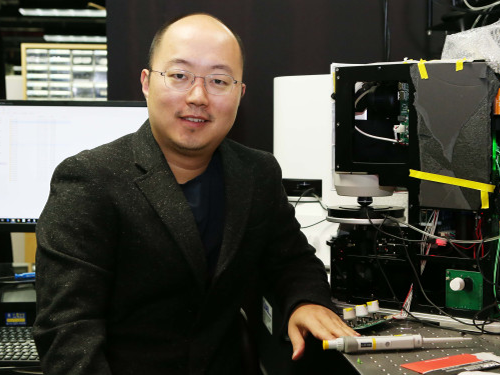 Meet the KAISTian of 2017, Professor YongKeun Park
Professor YongKeun Park from the Department of Physics is one of the star professors in KAIST. Rising to the academic stardom, Professor Park’s daily schedule is filled with series of business meetings in addition to lab meetings and lectures.
The year 2017 must have been special for him. During the year, he published numerous papers in international journals, such as Nature Photonics, Nature Communications and Science Advances. These high performances drew international attention from renowned media, including Newsweek and Forbes. Moreover, recognizing his research performance, he was elected as a fellow member of the Optical Society (OSA) in his mid-30s. Noting that the members’ age ranges from late 50s to early 60s, Professor Park’s case considered to be quite exceptional.
Adding to his academic achievement, he has launched two startups powered of his own technologies. One is called Tomocube, a company specialized in 3-D imaging microscope using holotomography technology. His company is currently exporting the products to multiple countries, including the United States and Japan. The other one is The.Wave.Talk which has technologies for examining pre-existing bacteria anywhere and anytime.
His research career and entrepreneurship are well deserved recipient of many honors. At the 2018 kick-off ceremony, Professor Park was awarded the KAISTian of 2017 in recognition of his developing holographic measure and control technology as well as founding a new field for technology application.
KAISTian of the Year, first presented in 2001, is an award to recognize the achievements and exemplary contribution of KAIST member who has put significant effort nationally and internationally, enhancing the value of KAIST.
While receiving the award, he thanked his colleagues and his students who have achieved this far together. He said, “I would like to thank KAIST for providing environment for young professors like me so that we can engage themselves in research. Also, I would like to mention that I am an idea seeder and my students do the most of the research. So, I appreciate my students for their hard works, and it is very pleasure to have them. Lastly, I thank the professors for teaching these outstanding students. I feel great responsibility over this title. I will dedicate myself to make further progress in commercializing technology in KAIST.”
Expecting his successful startup cases as a model and great inspiration to students as well as professors, KAIST interviewed Professor Park.
Q What made you decide to found your startups?
A I believed that my research areas could be further used. As a professor, I believe that it is a university’s role to create added value through commercializing technology and creating startups.
Q You have co-founded two startups. What is your role in each company?
A So, basically I have two full-time jobs, professor in KAIST and CTO in Tomocube. After transferring the technology, I hold the position of advisor in The.Wave.Talk.
(Holographic images captured by the product Professor Park developed)
Q Do your students also participate in your companies or can they?
A No, the school and companies are separate spaces; in other words, they are not participating in my companies. They have trained my employees when transferring the technologies, but they are not directly working for the companies.
However, they can participate if they want to. If there’s a need to develop a certain technology, an industry-academia contract can be made. According to the agreement, students can work for the companies.
Q Were there any hardships when preparing the startups?
A At the initial stage, I did not have a financial problem, thanks to support from Startup KAIST. Yet, inviting capital is the beginning, and I think every step I made to operate, generate revenue, and so on is not easy.
Q Do you believe KAIST is startup-friendly?
A Yes, there’s no school like KAIST in Korea and any other country. Besides various programs to support startup activities, Startup KAIST has many professors equipped with a great deal of experience. Therefore, I believe that KAIST provides an excellent environment for both students and professors to create startups.
Q Do you have any suggestion to KAIST institutionally?
A Well, I would like to make a comment to students and professors in KAIST. I strongly recommend them to challenge themselves by launching startups if they have good ideas. Many students wish to begin their jobs in government-funded research institutes or major corporates, but I believe that engaging in a startup company will also give them valuable and very productive experience.
Unlike before, startup institutions are well established, so attracting good capital is not so hard. There are various activities offered by Startup KAIST, so it’s worthwhile giving it a try.
Q What is your goal for 2018 as a professor and entrepreneur?
A I don’t have a grand plan, but I will work harder to produce good students with new topics in KAIST while adding power to my companies to grow bigger.
By Se Yi Kim from the PR Office
2018.01.03 View 12360
Meet the KAISTian of 2017, Professor YongKeun Park
Professor YongKeun Park from the Department of Physics is one of the star professors in KAIST. Rising to the academic stardom, Professor Park’s daily schedule is filled with series of business meetings in addition to lab meetings and lectures.
The year 2017 must have been special for him. During the year, he published numerous papers in international journals, such as Nature Photonics, Nature Communications and Science Advances. These high performances drew international attention from renowned media, including Newsweek and Forbes. Moreover, recognizing his research performance, he was elected as a fellow member of the Optical Society (OSA) in his mid-30s. Noting that the members’ age ranges from late 50s to early 60s, Professor Park’s case considered to be quite exceptional.
Adding to his academic achievement, he has launched two startups powered of his own technologies. One is called Tomocube, a company specialized in 3-D imaging microscope using holotomography technology. His company is currently exporting the products to multiple countries, including the United States and Japan. The other one is The.Wave.Talk which has technologies for examining pre-existing bacteria anywhere and anytime.
His research career and entrepreneurship are well deserved recipient of many honors. At the 2018 kick-off ceremony, Professor Park was awarded the KAISTian of 2017 in recognition of his developing holographic measure and control technology as well as founding a new field for technology application.
KAISTian of the Year, first presented in 2001, is an award to recognize the achievements and exemplary contribution of KAIST member who has put significant effort nationally and internationally, enhancing the value of KAIST.
While receiving the award, he thanked his colleagues and his students who have achieved this far together. He said, “I would like to thank KAIST for providing environment for young professors like me so that we can engage themselves in research. Also, I would like to mention that I am an idea seeder and my students do the most of the research. So, I appreciate my students for their hard works, and it is very pleasure to have them. Lastly, I thank the professors for teaching these outstanding students. I feel great responsibility over this title. I will dedicate myself to make further progress in commercializing technology in KAIST.”
Expecting his successful startup cases as a model and great inspiration to students as well as professors, KAIST interviewed Professor Park.
Q What made you decide to found your startups?
A I believed that my research areas could be further used. As a professor, I believe that it is a university’s role to create added value through commercializing technology and creating startups.
Q You have co-founded two startups. What is your role in each company?
A So, basically I have two full-time jobs, professor in KAIST and CTO in Tomocube. After transferring the technology, I hold the position of advisor in The.Wave.Talk.
(Holographic images captured by the product Professor Park developed)
Q Do your students also participate in your companies or can they?
A No, the school and companies are separate spaces; in other words, they are not participating in my companies. They have trained my employees when transferring the technologies, but they are not directly working for the companies.
However, they can participate if they want to. If there’s a need to develop a certain technology, an industry-academia contract can be made. According to the agreement, students can work for the companies.
Q Were there any hardships when preparing the startups?
A At the initial stage, I did not have a financial problem, thanks to support from Startup KAIST. Yet, inviting capital is the beginning, and I think every step I made to operate, generate revenue, and so on is not easy.
Q Do you believe KAIST is startup-friendly?
A Yes, there’s no school like KAIST in Korea and any other country. Besides various programs to support startup activities, Startup KAIST has many professors equipped with a great deal of experience. Therefore, I believe that KAIST provides an excellent environment for both students and professors to create startups.
Q Do you have any suggestion to KAIST institutionally?
A Well, I would like to make a comment to students and professors in KAIST. I strongly recommend them to challenge themselves by launching startups if they have good ideas. Many students wish to begin their jobs in government-funded research institutes or major corporates, but I believe that engaging in a startup company will also give them valuable and very productive experience.
Unlike before, startup institutions are well established, so attracting good capital is not so hard. There are various activities offered by Startup KAIST, so it’s worthwhile giving it a try.
Q What is your goal for 2018 as a professor and entrepreneur?
A I don’t have a grand plan, but I will work harder to produce good students with new topics in KAIST while adding power to my companies to grow bigger.
By Se Yi Kim from the PR Office
2018.01.03 View 12360 -
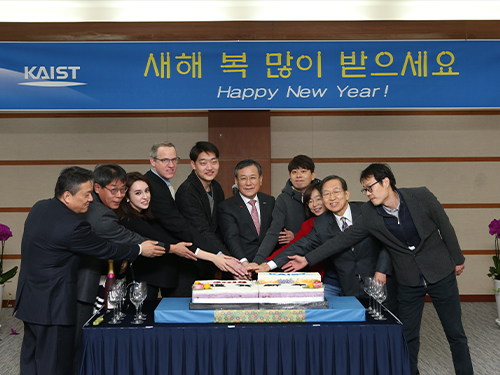 President Shin Reaffirms Innovation Initiatives in New Year Speech
(President Shin and representatives of faculty, students, staff celebrate the New Year in a reception held on January 2 at the auditorium.)
The KAIST community gathered to celebrate a fresh start for the year 2018. At the ceremony, held in the auditorium on January 2, members of KAIST community reaffirmed their commitment to be the trailblazers of Korea and beyond through unwavering innovations.
President Sung-Chul Shin presented his new vision and plan in his New Year speech, which focused on innovation for enhancing institutional competitiveness and global visibility. He said that as you are the future of KAIST, KAIST is the future of Korea. KAIST’s vision for a better future will have a significant impact on national progress and beyond. He stressed that innovation in the five pillars of education, research, technology commercialization, globalization, and future strategy will further advance the excellence of KAIST.
At the ceremony, President Shin also presented the award for ‘the KAISTian of the Year’ to Professor YongKeun Park of the Department of Physics. The annual award recognizes a distinguished professor whose academic accomplishments made the most significant impact.
In his New Year speech, President Shin said that the year 2018 will provide an opportunity to take a leap forward for becoming a ‘Global Value Creative, World-Leading University. The Vision 2031 Committee endorsed the five innovation initiatives to fulfill KAIST’s long-term vision and will open its recommendations to the public on March 20.
Educational innovation tops the initiatives. President Shin explained that the future of Korea is in the hands of talented individuals in science and technology, emphasizing the need to nurture creative, transdisciplinary talents with the capacity to enhance the social value of science and technology.
To this end, KAIST will establish a new undergraduate non-departmental program for transdisciplinary education. This plan will eventually provide students with more options in choosing their major, as well as help students build a strong foundation in basic science and engineering and encourage multidisciplinary approaches.
For creating an innovative institutional research infrastructure, KAIST plans to build a Network of Excellence for the Fourth Industrial Revolution (NExFire) for convergence research. The plan of ‘Cross-Generational Collaborative Labs,’ will bring out a new collaboration platform by pairing up senior and junior faculty. President Shin said it will be a stepping stone to extend the spectrum of knowledge without any cessation.
For technology commercialization, KAIST will maximize its intellectual property and economic value by stimulating technology-invested companies and startups. Close cooperation with venture capitalists at home and abroad will further accelerate the commercialization drive at KAIST.
Saying that the globalization is no long an option but a necessity, he stressed KAIST will strengthen its efforts to established a bilingual campus. “KAIST will make every effort to create a more welcoming and comfortable atmosphere for the international community and their families. We will expand benefits to our international community, such as access to the KAIST Child Care Center and collaboration with the Taejon Christian International School (TCIS),” he said. President Shin added he will further expand global networks and partnerships this year, participating in a diverse range of international events at home and abroad for increasing global visibility.
He also said that well-designed future strategies will complete innovation initiatives. The Future Strategy Research Center will serve as a think tank for identifying future agendas, establishing strategies and advocating for them.
In addition to the five innovation initiatives, President Shin emphasized a new organizational culture that embraces inclusiveness and mutual respect among all of the members of KAIST.
“So far, the ideal qualifications expected of KAISTians have included creativity and a challenging spirit. From now on, we will nurture talents with a focus on the 3Cs: Creativity, Challenge, and Caring. I would like to make a campus in which all members care for each other to help attain mutual growth with warmth and respect," he said.
For the full text, Click
2018.01.02 View 9900
President Shin Reaffirms Innovation Initiatives in New Year Speech
(President Shin and representatives of faculty, students, staff celebrate the New Year in a reception held on January 2 at the auditorium.)
The KAIST community gathered to celebrate a fresh start for the year 2018. At the ceremony, held in the auditorium on January 2, members of KAIST community reaffirmed their commitment to be the trailblazers of Korea and beyond through unwavering innovations.
President Sung-Chul Shin presented his new vision and plan in his New Year speech, which focused on innovation for enhancing institutional competitiveness and global visibility. He said that as you are the future of KAIST, KAIST is the future of Korea. KAIST’s vision for a better future will have a significant impact on national progress and beyond. He stressed that innovation in the five pillars of education, research, technology commercialization, globalization, and future strategy will further advance the excellence of KAIST.
At the ceremony, President Shin also presented the award for ‘the KAISTian of the Year’ to Professor YongKeun Park of the Department of Physics. The annual award recognizes a distinguished professor whose academic accomplishments made the most significant impact.
In his New Year speech, President Shin said that the year 2018 will provide an opportunity to take a leap forward for becoming a ‘Global Value Creative, World-Leading University. The Vision 2031 Committee endorsed the five innovation initiatives to fulfill KAIST’s long-term vision and will open its recommendations to the public on March 20.
Educational innovation tops the initiatives. President Shin explained that the future of Korea is in the hands of talented individuals in science and technology, emphasizing the need to nurture creative, transdisciplinary talents with the capacity to enhance the social value of science and technology.
To this end, KAIST will establish a new undergraduate non-departmental program for transdisciplinary education. This plan will eventually provide students with more options in choosing their major, as well as help students build a strong foundation in basic science and engineering and encourage multidisciplinary approaches.
For creating an innovative institutional research infrastructure, KAIST plans to build a Network of Excellence for the Fourth Industrial Revolution (NExFire) for convergence research. The plan of ‘Cross-Generational Collaborative Labs,’ will bring out a new collaboration platform by pairing up senior and junior faculty. President Shin said it will be a stepping stone to extend the spectrum of knowledge without any cessation.
For technology commercialization, KAIST will maximize its intellectual property and economic value by stimulating technology-invested companies and startups. Close cooperation with venture capitalists at home and abroad will further accelerate the commercialization drive at KAIST.
Saying that the globalization is no long an option but a necessity, he stressed KAIST will strengthen its efforts to established a bilingual campus. “KAIST will make every effort to create a more welcoming and comfortable atmosphere for the international community and their families. We will expand benefits to our international community, such as access to the KAIST Child Care Center and collaboration with the Taejon Christian International School (TCIS),” he said. President Shin added he will further expand global networks and partnerships this year, participating in a diverse range of international events at home and abroad for increasing global visibility.
He also said that well-designed future strategies will complete innovation initiatives. The Future Strategy Research Center will serve as a think tank for identifying future agendas, establishing strategies and advocating for them.
In addition to the five innovation initiatives, President Shin emphasized a new organizational culture that embraces inclusiveness and mutual respect among all of the members of KAIST.
“So far, the ideal qualifications expected of KAISTians have included creativity and a challenging spirit. From now on, we will nurture talents with a focus on the 3Cs: Creativity, Challenge, and Caring. I would like to make a campus in which all members care for each other to help attain mutual growth with warmth and respect," he said.
For the full text, Click
2018.01.02 View 9900 -
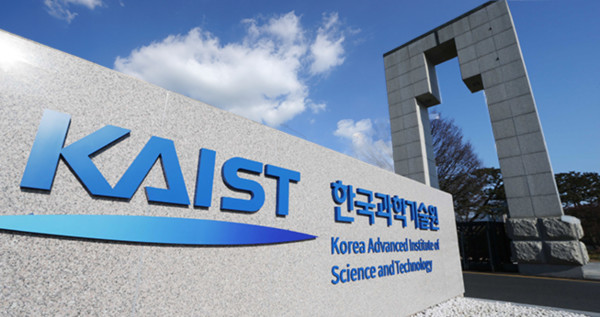 Eight Professors to Lead Top 100 Future Technologoies
On December 18, the National Academy of Engineering of Korea selected the 100 top future technologies that will be the engine growth for Korea in 2025. It also announced experts that will lead the selected technologies. Out of the 238 experts listed, eight professors are from KAIST.
The academy chose technologies based on their potential to be commercialized and contribution to developing related industries in Korea. Giving more weight to young scientists or engineers, it also selected up to three experts who are playing a crucial role in realizing each technology.
Out of 238 experts, 78 of them are from universities, 76 from major enterprises, 65 from public institutions and 19 from SMEs. KAIST is the instituttion that produced the second most experts, follwoing Seoul National University.
2017.12.26 View 5917
Eight Professors to Lead Top 100 Future Technologoies
On December 18, the National Academy of Engineering of Korea selected the 100 top future technologies that will be the engine growth for Korea in 2025. It also announced experts that will lead the selected technologies. Out of the 238 experts listed, eight professors are from KAIST.
The academy chose technologies based on their potential to be commercialized and contribution to developing related industries in Korea. Giving more weight to young scientists or engineers, it also selected up to three experts who are playing a crucial role in realizing each technology.
Out of 238 experts, 78 of them are from universities, 76 from major enterprises, 65 from public institutions and 19 from SMEs. KAIST is the instituttion that produced the second most experts, follwoing Seoul National University.
2017.12.26 View 5917 -
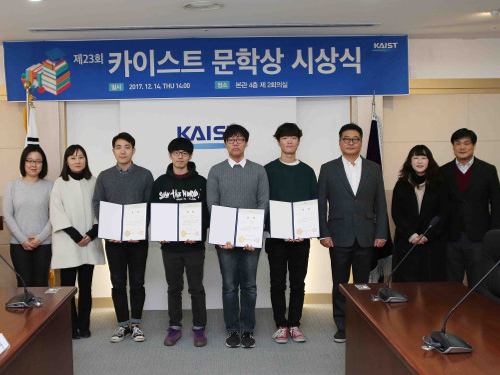 A Glance at the 2017 KAIST Literary Awards Ceremony
Since KAIST is a university specializing in science and engineering, people may think that the students rarely engage in literary activities. But KAIST students also excel in writing literature.
The 23rd KAIST Literary Award Ceremony was held on December 14 on the KAIST main campus. The award was established in 1995 to encourage students’ creative activities and to promote literary attainment. It is open to all KAIST students from undergraduate to masters and PhD students. This year, 43 students submitted a total of 68 literary works in the genres of poetry, novel, critique, and scenario.
KAIST professors Dong Ju Kim, Bong Gwan Jun, and Yunjeong Jo from the School of Humanities & Social Sciences participated as judges for the awards and they were joined by writers from the 8th Endless Road Program who served as invited judges for the novels and scenarios.
The Endless Road Program is a KAIST project for supporting artists who are engaged in literary works including scenarios, novels, webtoons, and movies by providing residences and funds. Novelists Jin Young Choi and Hak Chan Kim participated as judges for the novels and a drama scriptwriter, Joo Kim, as a judge of the scenarios.
After thorough evaluation, four submissions were chosen as awardees.
Section
Award
Name
Poetry
Winner
Sung Gil Moon (PhD candidate from the College of Business)
Runner-up
Jong Ik Jeon (Undergraduate student)
Novel
Winner
Joo Hwan Kim
(Undergraduate from the Dept. of Chemical and Biomolecular Engineering)
Runner-up
-
Essay & Critique
Winner
-
Runner-up
Jung Joon Park
(PhD candidate from the Dept. of Bio and Brain Engineering)
Scenario
Winner
-
Runner-up
-
The literary works as well as a review of the awards will be published in the KAIST Times in 2018.
2017.12.15 View 8362
A Glance at the 2017 KAIST Literary Awards Ceremony
Since KAIST is a university specializing in science and engineering, people may think that the students rarely engage in literary activities. But KAIST students also excel in writing literature.
The 23rd KAIST Literary Award Ceremony was held on December 14 on the KAIST main campus. The award was established in 1995 to encourage students’ creative activities and to promote literary attainment. It is open to all KAIST students from undergraduate to masters and PhD students. This year, 43 students submitted a total of 68 literary works in the genres of poetry, novel, critique, and scenario.
KAIST professors Dong Ju Kim, Bong Gwan Jun, and Yunjeong Jo from the School of Humanities & Social Sciences participated as judges for the awards and they were joined by writers from the 8th Endless Road Program who served as invited judges for the novels and scenarios.
The Endless Road Program is a KAIST project for supporting artists who are engaged in literary works including scenarios, novels, webtoons, and movies by providing residences and funds. Novelists Jin Young Choi and Hak Chan Kim participated as judges for the novels and a drama scriptwriter, Joo Kim, as a judge of the scenarios.
After thorough evaluation, four submissions were chosen as awardees.
Section
Award
Name
Poetry
Winner
Sung Gil Moon (PhD candidate from the College of Business)
Runner-up
Jong Ik Jeon (Undergraduate student)
Novel
Winner
Joo Hwan Kim
(Undergraduate from the Dept. of Chemical and Biomolecular Engineering)
Runner-up
-
Essay & Critique
Winner
-
Runner-up
Jung Joon Park
(PhD candidate from the Dept. of Bio and Brain Engineering)
Scenario
Winner
-
Runner-up
-
The literary works as well as a review of the awards will be published in the KAIST Times in 2018.
2017.12.15 View 8362 -
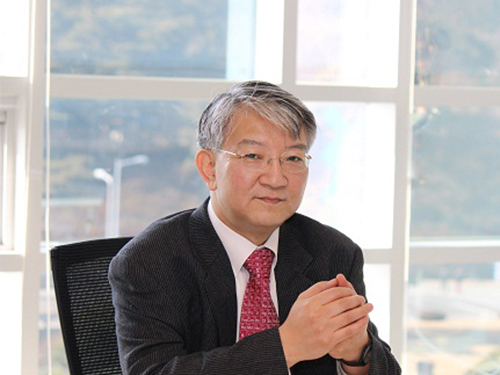 Distinguished Professor Sang Yup Lee Named NAI Fellow
(Distinguished Professor Sang Yup Lee)
Distinguished Professor Sang Yup Lee of the Department of Chemical and Biomolecular Engineering was named to the National Academy of Inventors in the US. He is the first Korean scholar ever elected as a NAI fellow.
The NAI is a non-profit member organization with over 4,000 individual inventors and fellows spanning more than 250 institutions worldwide. It is comprised of universities as well as governmental and non-profit research institutes. The academy was founded in 2010 to recognize and encourage inventors with patents from the US Patent and Trademark Office. So far, 575 fellows from 229 institutions have been elected.
The academy said Professor Lee has been recognized for fellowship induction as he has demonstrated a highly prolific spirit of innovation in creating or facilitating outstanding inventions that have made a tangible impact on quality of life, economic development, and the welfare of society.
Distinguished Professor Lee, a pioneering researcher and scholar in the field of systems metabolic engineering, was ranked in the top 1% of highly cited researchers (HCR) this year. Over the past 11 years, he published more than 130,000 articles in prestigious journals around the world. He has been cited more than 34,000 times since he started working at KAIST in 1994.
He is also the first Korean ever elected to both the National Academy of Sciences (NAS) and the National Academy of Engineering (NAE) in the US, becoming the one of 13 foreign scholars in the world holding two prestigious institutions’ fellowships.
Dr. Lee is currently the dean of KAIST Institutes, the world-leading institute for multi and interdisciplinary research. He is also serving as co-chair of the Global Council on Biotechnology and is a member of the Global Future Council on the Fourth Industrial Revolution at the World Economic Forum.
2017.12.13 View 9324
Distinguished Professor Sang Yup Lee Named NAI Fellow
(Distinguished Professor Sang Yup Lee)
Distinguished Professor Sang Yup Lee of the Department of Chemical and Biomolecular Engineering was named to the National Academy of Inventors in the US. He is the first Korean scholar ever elected as a NAI fellow.
The NAI is a non-profit member organization with over 4,000 individual inventors and fellows spanning more than 250 institutions worldwide. It is comprised of universities as well as governmental and non-profit research institutes. The academy was founded in 2010 to recognize and encourage inventors with patents from the US Patent and Trademark Office. So far, 575 fellows from 229 institutions have been elected.
The academy said Professor Lee has been recognized for fellowship induction as he has demonstrated a highly prolific spirit of innovation in creating or facilitating outstanding inventions that have made a tangible impact on quality of life, economic development, and the welfare of society.
Distinguished Professor Lee, a pioneering researcher and scholar in the field of systems metabolic engineering, was ranked in the top 1% of highly cited researchers (HCR) this year. Over the past 11 years, he published more than 130,000 articles in prestigious journals around the world. He has been cited more than 34,000 times since he started working at KAIST in 1994.
He is also the first Korean ever elected to both the National Academy of Sciences (NAS) and the National Academy of Engineering (NAE) in the US, becoming the one of 13 foreign scholars in the world holding two prestigious institutions’ fellowships.
Dr. Lee is currently the dean of KAIST Institutes, the world-leading institute for multi and interdisciplinary research. He is also serving as co-chair of the Global Council on Biotechnology and is a member of the Global Future Council on the Fourth Industrial Revolution at the World Economic Forum.
2017.12.13 View 9324 -
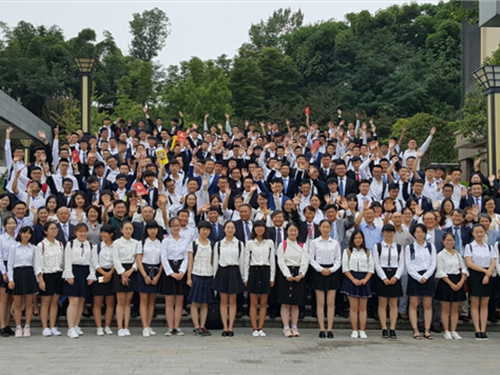 CLKIP Bearing Fruit in China
The Chongqing Liangjiang KAIST International Program (CLKIP) is rapidly gaining steam in China. CLKIP, an educational program operated in Chongqing internationally by KAIST since 2015, offers two majors, Electronic Information Engineering and Computer Science and Technology, applying the same curriculum as at KAIST.
To operate the program, KAIST assigns professors from the School of Electrical Engineering and the School of Computing to the program every year. They are in charge of one-third of the major courses, and transfer KAIST’s educational curriculum and know-how.
A total of 13 professors from Chongqing University of Technology (CQUT) have received or are receiving training on advanced education methodologies and technical know-how, including an on and offline integrated learning program, called Education 4.0 and large-scale internet open learning.As CLKIP is gaining in popularity, the number of students for its undergraduate courses keeps increasing, from 66 in 2015 to 172 in 2016 and 200 students in 2017, achieving the student volume for enrollment annually.
CLKIP selected seven exchange undergraduate students and five dual-degree students this fall, and they are currently studying in KAIST for either one semester or one full year.
CLKIP is located in Chongqing, one of the major direct-controlled municipalities and a focal point for notable government projects. The Korea-China industrial zone is also located in this area.
Considering its location, CLKIP is more than just an international programs for educational cooperation. The program will provide opportunities to cooperate with Korean enterprises including Hyundai, SK Hynix, LG Chem and Hankook Tire. While cooperating in research and development as well as technical assistance, KAIST hopes that these enterprises will play a bridging role for KAIST alumni entering the Chinese market.
President Sung-Chul Shin said, “The success of CLKIP shows that KAIST programs for fostering future manpower and developing cutting-edge technologies do work in other countries. Based on this case, KAST will put more effort into transferring our innovative education systems abroad. We are also pushing ahead to establish a joint institute between KAIST and CQUT by 2018, which will become a foundation for facilitating the entry of KAIST’s cutting-edge technologies into the Chinese market.”
“KAIST aims to become an entrepreneurial university that creates value through technology commercialization. In this sense, KAIST plans to transfer advanced technologies to domestic and international companies located in the Liangjiang district,” he added.
2017.12.12 View 11843
CLKIP Bearing Fruit in China
The Chongqing Liangjiang KAIST International Program (CLKIP) is rapidly gaining steam in China. CLKIP, an educational program operated in Chongqing internationally by KAIST since 2015, offers two majors, Electronic Information Engineering and Computer Science and Technology, applying the same curriculum as at KAIST.
To operate the program, KAIST assigns professors from the School of Electrical Engineering and the School of Computing to the program every year. They are in charge of one-third of the major courses, and transfer KAIST’s educational curriculum and know-how.
A total of 13 professors from Chongqing University of Technology (CQUT) have received or are receiving training on advanced education methodologies and technical know-how, including an on and offline integrated learning program, called Education 4.0 and large-scale internet open learning.As CLKIP is gaining in popularity, the number of students for its undergraduate courses keeps increasing, from 66 in 2015 to 172 in 2016 and 200 students in 2017, achieving the student volume for enrollment annually.
CLKIP selected seven exchange undergraduate students and five dual-degree students this fall, and they are currently studying in KAIST for either one semester or one full year.
CLKIP is located in Chongqing, one of the major direct-controlled municipalities and a focal point for notable government projects. The Korea-China industrial zone is also located in this area.
Considering its location, CLKIP is more than just an international programs for educational cooperation. The program will provide opportunities to cooperate with Korean enterprises including Hyundai, SK Hynix, LG Chem and Hankook Tire. While cooperating in research and development as well as technical assistance, KAIST hopes that these enterprises will play a bridging role for KAIST alumni entering the Chinese market.
President Sung-Chul Shin said, “The success of CLKIP shows that KAIST programs for fostering future manpower and developing cutting-edge technologies do work in other countries. Based on this case, KAST will put more effort into transferring our innovative education systems abroad. We are also pushing ahead to establish a joint institute between KAIST and CQUT by 2018, which will become a foundation for facilitating the entry of KAIST’s cutting-edge technologies into the Chinese market.”
“KAIST aims to become an entrepreneurial university that creates value through technology commercialization. In this sense, KAIST plans to transfer advanced technologies to domestic and international companies located in the Liangjiang district,” he added.
2017.12.12 View 11843 -
 Hubo Completes New Mission at the Winter Olympic Torch Relay
KAIST-born humanoid robot, Hubo, completed its special new mission: carrying the Olympic torch. The Winter Olympics will be held in PyeongChang for two weeks beginning February 9.
On December 11, the final leg of the torch relay in Daejeon for the PyeongChang Olympics 2018 took place inside KAIST. A city known for science and technology hosted special torch relay runners over three days.
Hubo arrived at the campus with Dr. Dennis Hong, a professor from the University of California at Los Angeles, in an autonomous vehicle. Then, Hubo received the flame from Professor Hong. Hubo, a robot developed by Professor Jun Ho Oh from the Department of Mechanical Engineering at KAIST, is best known for being the winner of the DARPA Robotics Challenge in 2015.
Hubo successfully completed its Olympic mission. That is, it had to drill through a wall to deliver the torch to the next runner. After completing the mission successfully, the torch was passed to Professor Oh. He ran a few steps and handed it over to the last runner of the Daejeon leg.
The last runner was Jung Jae Lee, who is a winning team member of the Samsung Junior Software Cup. Lee also had the honor of riding and controlling FX-2 which is another robot developed by Professor Oh for this peace torch relay. FX-2 took a few steps to finalize the relay.
Lee said, “I would like to become an expert in security. As I was riding the robot, I felt every step I took was one step closer to achieving of making major developments in the field of security.
Professor Oh said, “It is meaningful to see humans and robots cooperating with each other to carry out the torch relay.”
The torch relay, participated in by both humans and robots in Daejeon, was successfully completed and the torch headed off to Boryeong, Chungcheongnam-do.
2017.12.12 View 10974
Hubo Completes New Mission at the Winter Olympic Torch Relay
KAIST-born humanoid robot, Hubo, completed its special new mission: carrying the Olympic torch. The Winter Olympics will be held in PyeongChang for two weeks beginning February 9.
On December 11, the final leg of the torch relay in Daejeon for the PyeongChang Olympics 2018 took place inside KAIST. A city known for science and technology hosted special torch relay runners over three days.
Hubo arrived at the campus with Dr. Dennis Hong, a professor from the University of California at Los Angeles, in an autonomous vehicle. Then, Hubo received the flame from Professor Hong. Hubo, a robot developed by Professor Jun Ho Oh from the Department of Mechanical Engineering at KAIST, is best known for being the winner of the DARPA Robotics Challenge in 2015.
Hubo successfully completed its Olympic mission. That is, it had to drill through a wall to deliver the torch to the next runner. After completing the mission successfully, the torch was passed to Professor Oh. He ran a few steps and handed it over to the last runner of the Daejeon leg.
The last runner was Jung Jae Lee, who is a winning team member of the Samsung Junior Software Cup. Lee also had the honor of riding and controlling FX-2 which is another robot developed by Professor Oh for this peace torch relay. FX-2 took a few steps to finalize the relay.
Lee said, “I would like to become an expert in security. As I was riding the robot, I felt every step I took was one step closer to achieving of making major developments in the field of security.
Professor Oh said, “It is meaningful to see humans and robots cooperating with each other to carry out the torch relay.”
The torch relay, participated in by both humans and robots in Daejeon, was successfully completed and the torch headed off to Boryeong, Chungcheongnam-do.
2017.12.12 View 10974 -
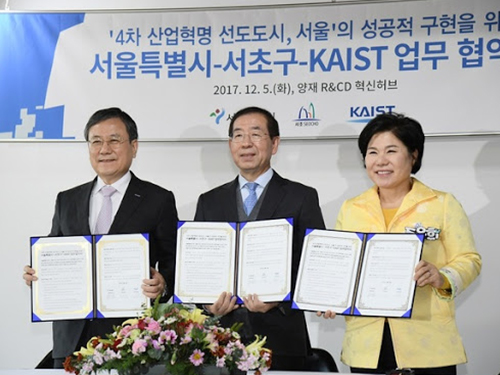 MoU by KAIST-Seoul-Seocho-gu for the 4th Industrial Revolution
The opening ceremony of the Yangjae R&CD Innovation Hub was held in Seoul on December 5. More than 400 guests came to the ceremony from major institutes and companies that are based in the hub. KAIST President Sung-Chul Shin, the Mayor of Seoul, Won-soon Park, and the Mayor of Seocho-gu, Eun Hee Cho, signed an MoU for Seoul to be the leading city for successfully realizing the Fourth Industrial Revolution.
The three organizations aim to cooperate with one another in various areas, including an economic boost for local job creation, technology development, and the promotion of projects through an industry-academia-institute network and fostering manpower.
Yangjae R&CD is the first facility specializing in and dedicated for Artificial Intelligence, which is the major topic of the Fourth Industrial Revolution.
The hub is comprised of enterprises specializing in AI, open co-work spaces, conference rooms, an open networking lounge, and spaces for fostering professional manpower. The hub will recruit additional enterprises and individuals who wish to move in. KAIST, an institute containing professors and researchers in the field of AI, and Modulabs, an organization becoming distinguished in AI research, will be in charge of operating the facility together.
The Yangjae R&CD Innovation Hub will operate a professional training program with participation from KAIST professors, which aims to produce 500 professionals in AI research and development by 2020. It will also provide inexpensive space as well as consultations and venture capital to startup and venture companies. It plans to find and foster 50 innovation companies by 2020.
In particular, the hub will operate a course for new AI business models 24 times over three years.
The hub also offers job consultations, academic conferences, public space for companies residing in the hub, a free GPU cluster server, technical training, seminars, forums, investment attraction, overseas expansion, and one-to-one technical consultations.
The Yangjae R&CD Zone is the place established for the Fourth Industrial Revolution by Seoul. R&CD is a concept combining Research and Development, Connection, Companies, Community, and Culture.
Seoul aims to create the Yangjae Zone as an urban innovation hub for facilitating industry-academia linkage as well as establishing a startup-settlement-growth technical ecosystem.
2017.12.11 View 10204
MoU by KAIST-Seoul-Seocho-gu for the 4th Industrial Revolution
The opening ceremony of the Yangjae R&CD Innovation Hub was held in Seoul on December 5. More than 400 guests came to the ceremony from major institutes and companies that are based in the hub. KAIST President Sung-Chul Shin, the Mayor of Seoul, Won-soon Park, and the Mayor of Seocho-gu, Eun Hee Cho, signed an MoU for Seoul to be the leading city for successfully realizing the Fourth Industrial Revolution.
The three organizations aim to cooperate with one another in various areas, including an economic boost for local job creation, technology development, and the promotion of projects through an industry-academia-institute network and fostering manpower.
Yangjae R&CD is the first facility specializing in and dedicated for Artificial Intelligence, which is the major topic of the Fourth Industrial Revolution.
The hub is comprised of enterprises specializing in AI, open co-work spaces, conference rooms, an open networking lounge, and spaces for fostering professional manpower. The hub will recruit additional enterprises and individuals who wish to move in. KAIST, an institute containing professors and researchers in the field of AI, and Modulabs, an organization becoming distinguished in AI research, will be in charge of operating the facility together.
The Yangjae R&CD Innovation Hub will operate a professional training program with participation from KAIST professors, which aims to produce 500 professionals in AI research and development by 2020. It will also provide inexpensive space as well as consultations and venture capital to startup and venture companies. It plans to find and foster 50 innovation companies by 2020.
In particular, the hub will operate a course for new AI business models 24 times over three years.
The hub also offers job consultations, academic conferences, public space for companies residing in the hub, a free GPU cluster server, technical training, seminars, forums, investment attraction, overseas expansion, and one-to-one technical consultations.
The Yangjae R&CD Zone is the place established for the Fourth Industrial Revolution by Seoul. R&CD is a concept combining Research and Development, Connection, Companies, Community, and Culture.
Seoul aims to create the Yangjae Zone as an urban innovation hub for facilitating industry-academia linkage as well as establishing a startup-settlement-growth technical ecosystem.
2017.12.11 View 10204 -
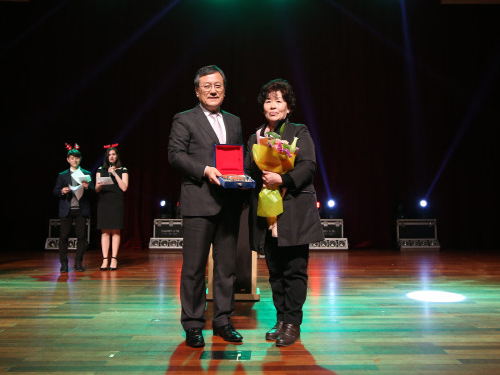 KAIST International Community Celebrates the Year-End
KAIST international community all gathered in celebration of the year-end on December 5 at the KAIST auditorium. This year, the community made the year-end party very special, expressing their appreciation very touching way at the event hosted by the International Scholar and Student Services (ISSS). Nearly 650 international faculty, students, and their family members joined the party.
Currently, 184 faculty members and researchers from 29 countries are working at KAIST, with 901 international students from 92 countries enrolled.
The two-hour party offered them a chance to enjoy a wide variety of activities and events, including dance performances, student performances, games, and dinner.
The party also had a meaningful award ceremony. Prior to the event, a month-long survey was conducted, asking international scholars and students which on-campus team they were most thankful for this year. Candidates for the appreciation award were: Safety and Security Team, Student Affairs Team, Campus Police, dormitory supervisors, and campus cleaning staff.
Approximately 470 scholars and students responded to the survey and 214 voted for the campus cleaning staff (45.5%).
(President Sung-Chul Shin and Myeongja Kim)
Ms. Myeongja Kim, a director of the cleaning staff in the undergraduate zone, received the award on behalf of the entire cleaning staff. At the ceremony, President Sung-Chul Shin conferred the award.
President Shin in his welcoming remarks said that globalization is his priority and urgent mission. To make KAIST more globalized, he said he will focus on three agendas; to make the campus KAIST a more welcoming environment for international community; to make campus more inclusive and diverse; to enhance the global visibility of KAIST more proactively. Click for the full text of opening remarks
2017.12.11 View 6194
KAIST International Community Celebrates the Year-End
KAIST international community all gathered in celebration of the year-end on December 5 at the KAIST auditorium. This year, the community made the year-end party very special, expressing their appreciation very touching way at the event hosted by the International Scholar and Student Services (ISSS). Nearly 650 international faculty, students, and their family members joined the party.
Currently, 184 faculty members and researchers from 29 countries are working at KAIST, with 901 international students from 92 countries enrolled.
The two-hour party offered them a chance to enjoy a wide variety of activities and events, including dance performances, student performances, games, and dinner.
The party also had a meaningful award ceremony. Prior to the event, a month-long survey was conducted, asking international scholars and students which on-campus team they were most thankful for this year. Candidates for the appreciation award were: Safety and Security Team, Student Affairs Team, Campus Police, dormitory supervisors, and campus cleaning staff.
Approximately 470 scholars and students responded to the survey and 214 voted for the campus cleaning staff (45.5%).
(President Sung-Chul Shin and Myeongja Kim)
Ms. Myeongja Kim, a director of the cleaning staff in the undergraduate zone, received the award on behalf of the entire cleaning staff. At the ceremony, President Sung-Chul Shin conferred the award.
President Shin in his welcoming remarks said that globalization is his priority and urgent mission. To make KAIST more globalized, he said he will focus on three agendas; to make the campus KAIST a more welcoming environment for international community; to make campus more inclusive and diverse; to enhance the global visibility of KAIST more proactively. Click for the full text of opening remarks
2017.12.11 View 6194 -
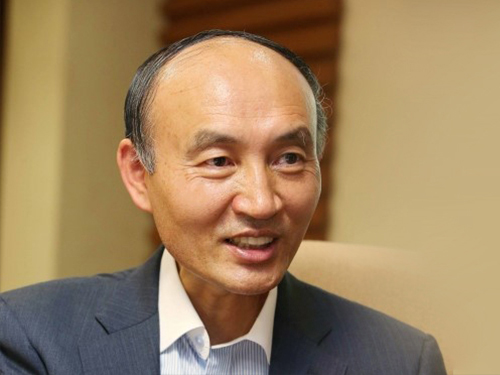 Professor Dong Ho Cho Awarded at the Haedong Conference 2017
Professor Dong Ho Cho of the School of Electrical Engineering at KAIST received an award at the 13th Haedong Conference 2017 in Seoul on the first of December.
The Korean Institute of Communications and Information Sciences recognized Professor Cho for his significant contributions in the field of mobile communication networks. He has carried out groundbreaking research on mobile systems, including architecture, protocols, algorithms, optimization, and efficiency analysis.
As a result, he has produced 73 papers in renowned international journals, 138 papers at international conferences, and filed 52 international patents and 121 domestic patents. In addition, he transferred 14 of the patents he filed to Korean and international companies.
2017.12.07 View 7117
Professor Dong Ho Cho Awarded at the Haedong Conference 2017
Professor Dong Ho Cho of the School of Electrical Engineering at KAIST received an award at the 13th Haedong Conference 2017 in Seoul on the first of December.
The Korean Institute of Communications and Information Sciences recognized Professor Cho for his significant contributions in the field of mobile communication networks. He has carried out groundbreaking research on mobile systems, including architecture, protocols, algorithms, optimization, and efficiency analysis.
As a result, he has produced 73 papers in renowned international journals, 138 papers at international conferences, and filed 52 international patents and 121 domestic patents. In addition, he transferred 14 of the patents he filed to Korean and international companies.
2017.12.07 View 7117 -
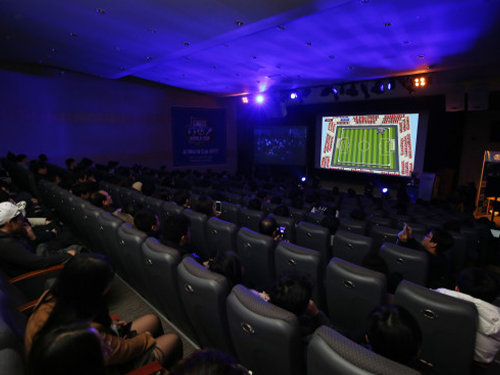 CBNU Wins the First AI World Cup 2017
KAIST hosted the first AI World Cup 2017. A total of 26 teams, comprised of Korean undergraduates or graduates, participated in AI Soccer, AI Commentator, and AI Reporter competitions.
On the first of December, the final tournament for AI Soccer was held in the KI Building. More than 200 people came to watch the first AI soccer match based on the Deep-Q Network Learning. The games were commentated by two KAIST students who humorously interpreted the games, catching people’s attention.
In AI Soccer, 18 teams participated, and KAIST BML (KAIST), AIM (KAIST), WISRL (KAIST), and AR Lab (Chonbuk National University) made it to the final four. Each team had its own unique style and strategy.
After some fierce contests, the win went to AR Lab, which showed fearless attacks throughout the game. Having no goalkeeper, AR Lab focused on attacking. According to the team, instead of training individual players, they concentrated on training a manager that directed the players, giving them a choice when to attack and defend.
(AR Lab from Chonbuk National University, the winning team of AI Soccer tournament)
Different from humans playing soccer, it was interesting to see how AI robots self-improved their movements while playing the games.
For AI Commentators, judges looked for a team with the most accuracy, forecasting ability, and fluency. Four teams competed, and the Yally team won the title.
For AI Reporters, which required informativeness and reliability, four teams participated, and the prize went to a team, named Deep CMT (KAIST).
Although this year’s games only included domestic universities, KAIST plans to extend participation to university students from around the world in the future, and hopes that the AI World Cup 2017 will become the foundation for launching the next games on an international level.
2017.12.04 View 5757
CBNU Wins the First AI World Cup 2017
KAIST hosted the first AI World Cup 2017. A total of 26 teams, comprised of Korean undergraduates or graduates, participated in AI Soccer, AI Commentator, and AI Reporter competitions.
On the first of December, the final tournament for AI Soccer was held in the KI Building. More than 200 people came to watch the first AI soccer match based on the Deep-Q Network Learning. The games were commentated by two KAIST students who humorously interpreted the games, catching people’s attention.
In AI Soccer, 18 teams participated, and KAIST BML (KAIST), AIM (KAIST), WISRL (KAIST), and AR Lab (Chonbuk National University) made it to the final four. Each team had its own unique style and strategy.
After some fierce contests, the win went to AR Lab, which showed fearless attacks throughout the game. Having no goalkeeper, AR Lab focused on attacking. According to the team, instead of training individual players, they concentrated on training a manager that directed the players, giving them a choice when to attack and defend.
(AR Lab from Chonbuk National University, the winning team of AI Soccer tournament)
Different from humans playing soccer, it was interesting to see how AI robots self-improved their movements while playing the games.
For AI Commentators, judges looked for a team with the most accuracy, forecasting ability, and fluency. Four teams competed, and the Yally team won the title.
For AI Reporters, which required informativeness and reliability, four teams participated, and the prize went to a team, named Deep CMT (KAIST).
Although this year’s games only included domestic universities, KAIST plans to extend participation to university students from around the world in the future, and hopes that the AI World Cup 2017 will become the foundation for launching the next games on an international level.
2017.12.04 View 5757 -
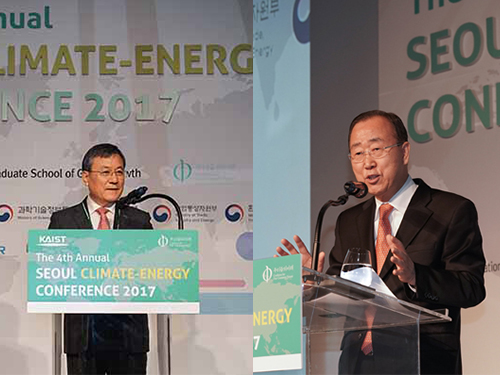 Seoul Climate-Energy Conference Seeks Global Sustainability
(President Shin and Former UN Secretary General at the Seoul Climate Change-Energy Conference)
Global leaders from both the private and public sectors discussed creative ways to seek inclusive green growth and sustainable development at the Seoul Climate-Energy Conference on November 24 in Seoul. The annual conference was co-hosted by KAIST and the Coalition for Our Common Future under the theme “Creating New Momentum for the Paris Agreement and a Sustainable Future.”
More than 100 global leaders participated in the forum including the Director General Frank Rijsbermanof the Global Green Growth Institute and Executive Director Howard Bamsey of the Green Climate Fund. Former UN Secretary-General Ban Ki-Moon, who played a significant role in the signing of the Paris Agreement, was the keynote speaker.
This year’s conference focused on Korea’s low carbon-energy transition and the Fourth Industrial Revolution to be aligned with green growth. At the conference, speakers and participants reviewed the progress of the decisions made by the UN Framework Convention on Climate Change (UNFCCC) COP23 in Bonn, Germany. The conference discussed topics of global collaboration for new climate regimes, green energy infrastructure, the Asia super grid, financing green energy, smart green cities, and new mobility.
President Sung-Chul Shin emphasized global action and greater resilience toward climate change in his opening remarks. He said, “Today’s climate change can be attributed directly to the past three industrial revolutions. As industrialization continues, we must not make future generations pay the cost of this Fourth Industrial Revolution.” He explained that it is increasingly complicated to address climate change and energy issues because even though the use of energy consumption will continue to increase, energy policies are interwoven with global politics.
He stressed three keywords to better address this global problem: innovation, collaboration, and speed. First he emphasized innovation as a priority for future success as it is hard to retain confidence without innovation.
He noted KAIST has made sustainability initiatives in the fields of EEWS (energy, environment, water, sustainability) and green mobility. He also noted the importance of collaboration as industries are moving beyond a single discipline. KAIST is making collaborations in R&D and sustainability sectors, such as Saudi Aramco’s CO2 management center in KAIST. Finally, he explained that the speed of new transformation will be beyond our imagination, and governments should work efficiently to address issues in a fast manner.
Meanwhile, Secretary-General Ban called for global unity in addressing climate change. He strongly emphasized that countries should make agreements not of willingness but of action, and that politicians should realize that this global agenda should be given top priority above domestic politics. He addressed how the world is experiencing the most powerful and destructive effects of climate change which makes active participation in the Paris Agreement increasingly important.
He expressed his concern that the richest and most powerful countries are backing off, emphasizing the role of these countries as both global leaders and top producers of CO2. He also shared his hopes that the OECD will continue to work to fill the absence of the United States, and stressed the importance of acquiring 10 billion USD by 2020 to fund mitigation and adaptation technologies for developing countries’ CO2 emissions.
Click for President Shin's opening remarks
2017.11.29 View 9201
Seoul Climate-Energy Conference Seeks Global Sustainability
(President Shin and Former UN Secretary General at the Seoul Climate Change-Energy Conference)
Global leaders from both the private and public sectors discussed creative ways to seek inclusive green growth and sustainable development at the Seoul Climate-Energy Conference on November 24 in Seoul. The annual conference was co-hosted by KAIST and the Coalition for Our Common Future under the theme “Creating New Momentum for the Paris Agreement and a Sustainable Future.”
More than 100 global leaders participated in the forum including the Director General Frank Rijsbermanof the Global Green Growth Institute and Executive Director Howard Bamsey of the Green Climate Fund. Former UN Secretary-General Ban Ki-Moon, who played a significant role in the signing of the Paris Agreement, was the keynote speaker.
This year’s conference focused on Korea’s low carbon-energy transition and the Fourth Industrial Revolution to be aligned with green growth. At the conference, speakers and participants reviewed the progress of the decisions made by the UN Framework Convention on Climate Change (UNFCCC) COP23 in Bonn, Germany. The conference discussed topics of global collaboration for new climate regimes, green energy infrastructure, the Asia super grid, financing green energy, smart green cities, and new mobility.
President Sung-Chul Shin emphasized global action and greater resilience toward climate change in his opening remarks. He said, “Today’s climate change can be attributed directly to the past three industrial revolutions. As industrialization continues, we must not make future generations pay the cost of this Fourth Industrial Revolution.” He explained that it is increasingly complicated to address climate change and energy issues because even though the use of energy consumption will continue to increase, energy policies are interwoven with global politics.
He stressed three keywords to better address this global problem: innovation, collaboration, and speed. First he emphasized innovation as a priority for future success as it is hard to retain confidence without innovation.
He noted KAIST has made sustainability initiatives in the fields of EEWS (energy, environment, water, sustainability) and green mobility. He also noted the importance of collaboration as industries are moving beyond a single discipline. KAIST is making collaborations in R&D and sustainability sectors, such as Saudi Aramco’s CO2 management center in KAIST. Finally, he explained that the speed of new transformation will be beyond our imagination, and governments should work efficiently to address issues in a fast manner.
Meanwhile, Secretary-General Ban called for global unity in addressing climate change. He strongly emphasized that countries should make agreements not of willingness but of action, and that politicians should realize that this global agenda should be given top priority above domestic politics. He addressed how the world is experiencing the most powerful and destructive effects of climate change which makes active participation in the Paris Agreement increasingly important.
He expressed his concern that the richest and most powerful countries are backing off, emphasizing the role of these countries as both global leaders and top producers of CO2. He also shared his hopes that the OECD will continue to work to fill the absence of the United States, and stressed the importance of acquiring 10 billion USD by 2020 to fund mitigation and adaptation technologies for developing countries’ CO2 emissions.
Click for President Shin's opening remarks
2017.11.29 View 9201